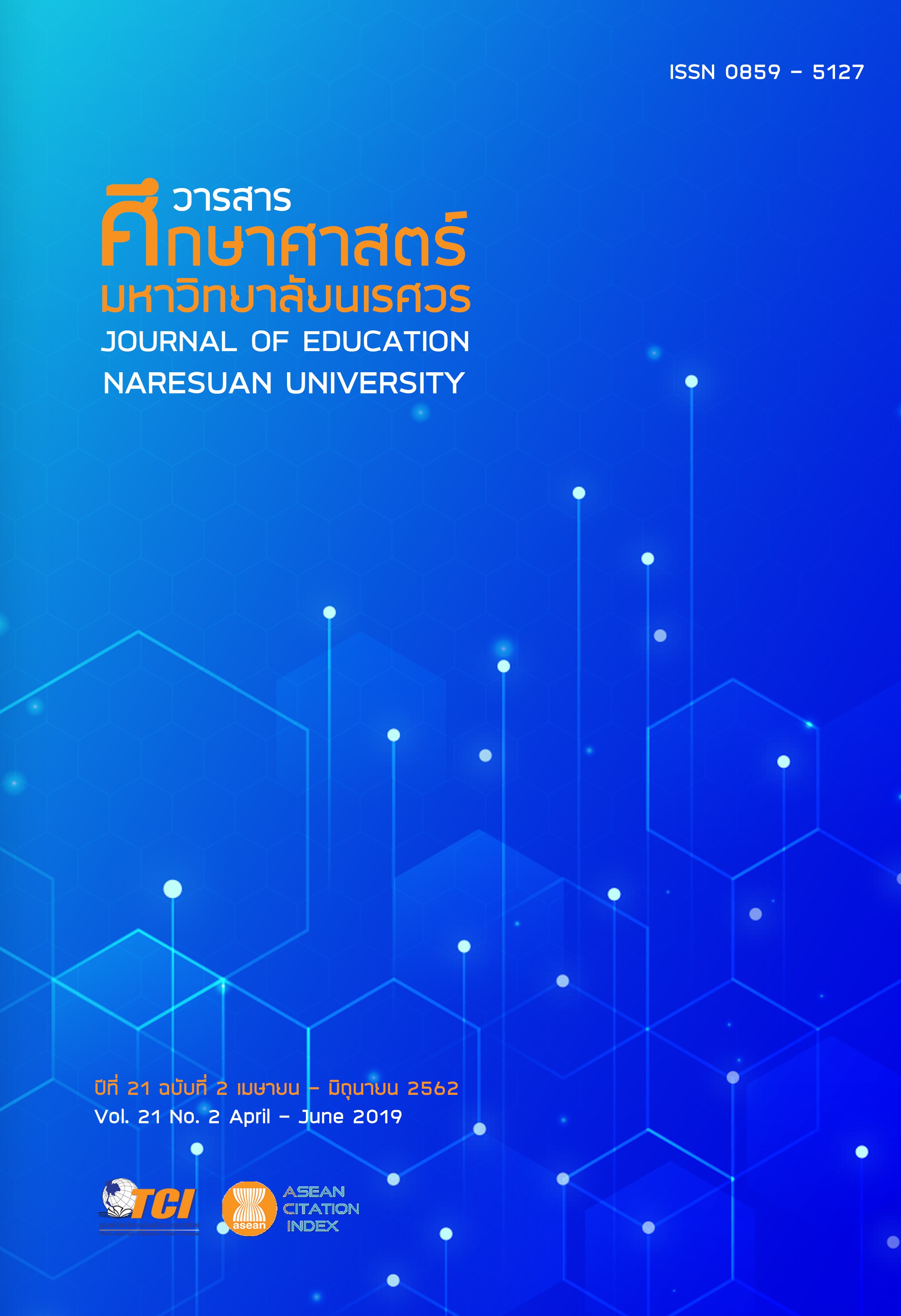การพัฒนาคุณลักษณะผู้นำเยาวชนด้านเศรษฐกิจพอเพียง (THE DEVELOPMENT OF YOUTH LEADERSHIP CHARACTERISTICS IN SUFFICIENCY ECONOMY)
Main Article Content
Abstract
การวิจัยครั้งนี้เป็นการวิจัยและพัฒนา ใช้วิธีการรวบรวมข้อมูลแบบผสมผสาน (Mixed Method) ทั้งเชิงปริมาณ เชิงคุณภาพ มีวัตถุประสงค์เพื่อ 1) เพื่อพัฒนากิจกรรมคุณลักษณะผู้นำเยาวชนด้านเศรษฐกิจพอเพียง กระบวนการวิจัย ดำเนินตาม 3 ขั้นตอนหลักคือ (1) ศึกษาคุณลักษณะผู้นำเยาวชนด้านเศรษฐกิจพอเพียง โดย ศึกษาจากเอกสาร แนวคิด ทฤษฎีและศึกษาจากการสัมภาษณ์เชิงลึกจากผู้ทรงคุณวุฒิที่มีความเชี่ยวชาญ (2) เพื่อสร้างกิจกรรมคุณลักษณะผู้นำเยาวชนด้านเศรษฐกิจพอเพียง และให้ผู้เชี่ยวชาญประเมิน 8 กิจกรรม (3) เพื่อประเมินผลการพัฒนาคุณลักษณะผู้นำเยาวชนด้านเศรษฐกิจพอเพียง โดยการสร้างเครื่องมือวัดคุณลักษณะของผู้นำ และทดลองใช้ กลุ่มตัวอย่างที่ใช้ในการวิจัย ได้แก่ นักเรียนในระดับชั้นมัธยมศึกษาปีที่ 4,5,6 โรงเรียนดอนเมืองจาตุรจินดา จำนวน 30 คน โดยเลือกแบบเจาะจง (Purposive Sampling) และกลุ่มผู้ให้ข้อมูลหลัก ได้แก่ ผู้เชี่ยวชาญ ผู้ทรงคุณวุฒิ ครูที่ปรึกษา และครูประจำวิชา จำนวน 22 คน เครื่องมือที่ใช้รวบรวมข้อมูลเป็นแบบสอบถาม ชนิดมาตราส่วน ประมาณค่า และแบบสัมภาษณ์ วิเคราะห์ข้อมูลโดยการหาค่าความถี่ ร้อยละ ค่าเฉลี่ย ส่วนเบี่ยงเบนมาตรฐาน การทดสอบค่าที (T-test) และวิเคราะห์เนื้อหา (Content Analysis) ปรับปรุงกิจกรรม ประเมินเพื่อยืนยันคุณลักษณะผู้นำเยาวชนด้านเศรษฐกิจพอเพียง และจัดทำคู่มือการใช้กิจกรรมพัฒนาคุณลักษณะผู้นำเยาวชนด้านเศรษฐกิจพอเพียง ผลการวิจัย พบว่า 1) คุณลักษณะผู้นำเยาวชนด้านเศรษฐกิจพอเพียง ได้แก่ (1.1) มีภูมิคุ้มกันที่ดีในการรักษาตนเอง ครอบครัว และประเทศชาติ (1.2) มีความกระตือรือร้น กล้าคิด กล้าทำ กล้าแสดงออก (1.3) มีคุณธรรมด้านความประหยัด ซื่อสัตย์ รับผิดชอบประเทศชาติ (1.4) มีความใส่ใจใฝ่เรียนรู้ด้านเศรษฐกิจพอเพียง (1.5) มีความกล้าหาญ อดทนและเสียละ 2) กิจกรรมพัฒนาคุณลักษณะผู้นำเยาวชนด้านเศรษฐกิจพอเพียง มี 8 กิจกรรม (2.1) กิจกรรมสัมพันธไมตรี (2.2) กิจกรรม ยุวกวีพอเพียง (2.3) กิจกรรมจำเรียงถ้อยร้อยกรอง (2.4) กิจกรรมตามครรลองปรัชญา (2.5) กิจกรรมเพื่อนพึ่ง(ภา)ยามยาก (2.6) กิจกรรมหลายหลากล้วนลำนำ (2.7) กิจกรรมประพฤติธรรมล้ำความดี (2.8) กิจกรรมนำวิถีเยาวชนพอเพียง 3) เยาวชนมีคุณลักษณะผู้นำเยาวชนด้านเศรษฐกิจพอเพียงภายหลังการทดลองสูงกว่าก่อนการทดลองอย่างมีนัยสำคัญทางสถิติที่ระดับ .05
THE DEVELOPMENT OF YOUTH LEADERSHIP CHARACTERISTICS IN SUFFICIENCY ECONOMY
The aims of this research are the study and development by using the mixed information gathering methods (Mixed Method): quantitative and qualitative techniques aspiring. 1) To develop the characteristics of youth leaders in the aspects of sufficiency economy and research procedures which implement 3 steps comprised of (1) Studying characteristics of youth leaders in the facets of sufficiency economy by studying documents, ideas, theories, and in-depth interviews with professional experts (2)Creating activities to enhance the sufficiency economy attribute in youth leadership and having 8 activities assessed by professional experts (3) Assessing the results of the development of characteristics in youth leaders in the aspects of the sufficiency economy by devising apparatus for measuring the characteristics of leadership, and trialing it. The research demographic involved the group of 30 higher secondary school students of Donmuangchaturachinda School using Stratified Random Sampling. Information was gathered mainly by experts, professional, advisory teachers, and subject teachers of 22 persons.Questionnaires:rating scale, approximation, and interview form, which analyzes the data by finding the Frequency Percentage Mean Standard Deviation (S.D.) T-Test and Content Analysis in order to improve activities and evaluate to substantiate the characteristics of youth leadership in sufficiency economy and create a manual used in the activities aiming at developing the characteristics of youth leadership in sufficiency economy. The findings of the research study were: 1) the attribute qualification in sufficiency economy in youth leadership were (1.1) Self-protect immunity in family and country. (1.2) Be enthusiastic, decisive and assertive. (1.3) Be merit in sufficient, honest, and responsible to their country. (1.4) Be curiosity in sufficiency economy. (1.5) Be brave, patient and sacrifice. 2) The eight activities of Sufficient Economy were (2.1) How to be good relation. (2.2) Youth Lyric in Sufficiency Economy. (2.3) Thai compose in Sufficiency Economy (2.4) Life Philosophy (2.5) Reciprocity (2.6) Several activities to sufficiency (2.7) Moral to merit (2.8) Role construct to Sufficient Economy.3) There was statistically significant differences at .05 after the experimental activities.
Article Details
The owner of the article does not copy or violate any of its copyright. If any copyright infringement occurs or prosecution, in any case, the Editorial Board is not involved in all the rights to the owner of the article to be performed.
References
2. Chareonwongsak, K. (2008). The 5th wave- social philosophy: Thai society that suitable in the 21st century (9th ed.). Bangkok: Success Media. [in Thai]
3. Covey, S. R. (1996). Three roles of the leader in the new paradigm. Englewood Cliffs, New Jersey: Prentice- Hall.
4. Dessler, G. (1998). Personnel/human resource management (5th ed.). Englewood Cliffs, New Jersey: Prentice- Hall.
5. Jaiyakiew, A. (2012). The practical applications of the philosophy of self sufficiency economy in schools under Elementary Education Office Chiang Rai, District 3: Bansankong School case study in Mae Chan, Chiang Rai (Master thesis). Mae Fah Luang University. [in Thai]
6. Maiklad, P. (2006). The scholastic discussion about follow my father’s steps…sufficiency economy. Nonthaburi: Sukhothai Thammathirat Open University. [in Thai]
7. Meejang, S., Kijkueakoon, S., Panawong, C., Yafu, S., Duangnate, S., & Benjaariyakul, S., (2011). The research and development of local curriculum in sufficient economy by managing knowledge: Studying the case of an increasing of the growing quantity of Banana Moo.3 Banwangvon Tapho District Muang Phitsanulok City Phitsanulok Province. Naresuan University Journal, 13(2), 1-5. [in Thai]
8. Na Bangchang, Y. (2008). The results of using the mt method for reinforcing the frugal personality according to the philosophy of the sufficiency economy in prathomsuksa four, five, and six students (Master thesis). Bangkok: Chulalongkorn University. [in Thai]
9. Nantachai, S. (2006). The sufficiency values. The Processing of Scholastic Articles in Educational Administration. Bangkok: Extension and Training Office, Kasetsart University. [in Thai]
10. Prasertsri, R. (2001). Leadership. Bangkok: Thanatat Publication. [in Thai]
11. Stogdill, R. M. (1990). Handbook of leadership: Survey of theory and research. New York: Free Press.
12. Tiyao, S. (2008). Principles of Management (4nd ed.). Bangkok: Thammasat University Press. [in Thai]
13. Trewatha, R. L., & Newport, G. M. (1982). Management (3rd ed.). Plano, Texas: Business Publication.
14. Vinijkumtorn, T. (2005). The inculcation of values through the sufficiency economy philosophy in prathomsuksa five students by using the process according to bloom and rath's principles (Master thesis). Bangkok: Chulalongkorn University. [in Thai]
15. Waleewong, O., Chaisong, S., & Thammarangsee, T. (2010). Roles and behaviors of parents that inflict drinking habits on the Thai youth. Bangkok: Center for Alcoholic Studies, International Health Policy Program. [in Thai]


